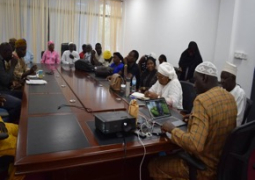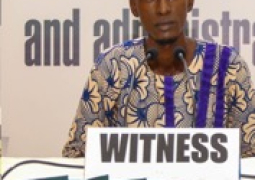
The paper was presented by the Union’s Secretary General Modou S. Joof and called for the bill to be opened to wider public consultations.
While presenting the paper, Mr Joof stated that “Sections 6 and 7 in the bill appear to contain redundant provisions which may be therefore subjected to separate and duplicate criminal penalties.”
“It is worth emphasising that there are absolutely no safeguards for public interest investigations or news reporting.” While “cyberbullying” appears in the definitions section of section 2, this “definition” merely repeats the language of section 7 in a circular manner, he explained. He added that anyone “assisting” or “encouraging” such conduct is also guilty of cyberbullying, making reference to the bill.
“It is unclear what it means to ‘encourage’ one to cause fear or harm to someone’s reputation, and this captures a potentially limitless amount of conduct. Under this framing, a member of the public who is simply commenting or reposting a critical news article exposing the misdeeds of a government official could be deemed to be providing ‘assistance’ or ‘encouragement’ for bullying that official.”
According GPU, Section 12(1) of the Draft Bill punishes any person who ‘does an unauthorised act’ in relation to a computer system or data, where they ‘know’ that it is unauthorised. Section 12(5) provides convoluted definitions including that a “reference to doing an act includes causing an act to be done,” and that an “act” includes a “series of acts.”
“Nowhere is it defined what an “act” entails, neither is the fact that an “act” must merely be in “relation” to a computer system clarified. There is no clarity at all on what conduct 12 (1) criminalises, and as such, it fails the test of legality,” Mr. Joof pointed out.
With due regard to the 1997 Constitution, conventions and treaties to which The Gambia is a party, the Union recommended that the provisions in Section 6 1(a) and subsections (b) and (c) of the Cybercrime Bill, 2023, should either be removed entirely or revised to ensure they do not infringe upon fundamental rights and freedoms.
The Union also recommended that Sections 5, 6 and 7 must be stricken entirely. “They consistently fail the tripartite test of permissible restrictions of expression, particularly the test of legality in that they contain vague and overbroad prohibitions that have been routinely rejected under international standards.
“Many restrictions do not pursue a legitimate aim as explicitly enumerated in Article 19 paragraph 3 of the ICCPR. Further, they constitute cyber enabled, rather than cyber dependent offenses, and as such are inappropriate to include in a cybercrime law.”
They also recommend to Strike section 12 entirely, “which fails the test of legality and is so broadly worded that it would criminalise public interest journalism or reporting.”
“Strike section 13 as written, which does not track any existing internationally or regionally accepted cybercrime, and would criminalise not only academic and security research, but also the widespread use of digital security and anonymity tools by journalists and human rights defenders.”
“Section 15 must be stricken as written; individual criminal liability for corporate actions should never automatically attach in a ‘guilty unless proven innocent’ manner, but instead must require specific intent to cause an identifiable harm that is justified under international standards.”
The Union further recommended that the Cybercrime Bill, 2023, be subjected to a thorough review in line with principles of freedom of expression 7, and international human rights standards and principles.
It also recommended for Education Committee’s public consultations on Cybercrime Bill, 2023 be widened to involve all relevant stakeholders including the National Human Rights Commission, Gambia Bar Association, Female Lawyers Association, consumer groups like the Consumer Protection Alliance, and political parties etc.
Mr Joof acknowledged that the Cybercrime Bill, 2023, is aimed at improving the Gambia’s capacity to respond to cybercrime incidents adequately, according to the minister for Communication and Digital Economy, on whose behalf the Bill was presented to the National Assembly on March 4, 2023.
He added that the Gambia Press Union’s position paper on the Cybercrime Bill, 2023 seeks to examine the legal framework to present a case on how it meets (or fails to meet) the standards necessary for the promotion and protection of press freedom and freedom of expression in The Gambia.
“We did share a draft position paper on the Bill with the Committee on March 17, 2024 which was just a 5-page document initially submitted to parliament a night before the first reading of the Bill - calling for it to be opened to wider public consultations.”





